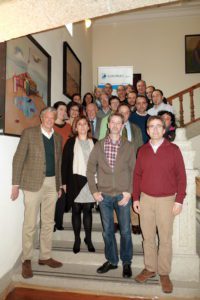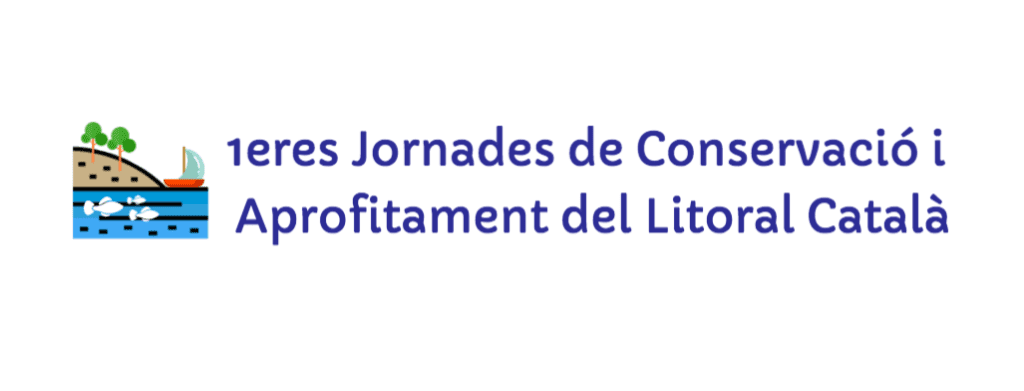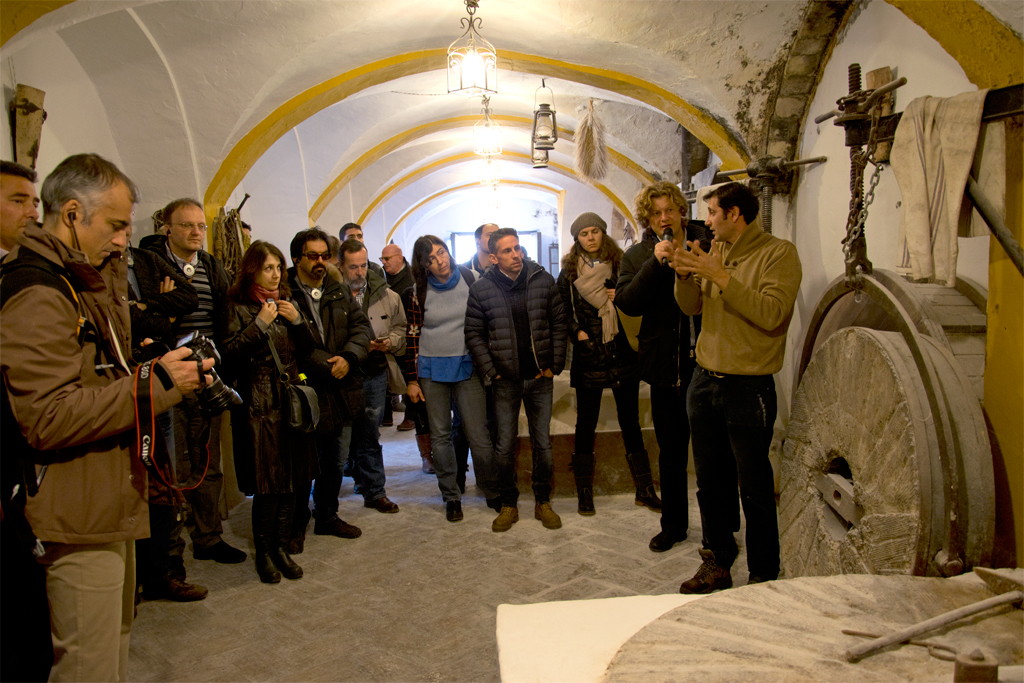EUROPARC Spain: new President and Council elected today
(left to right) Eulàlia Comas Lamarca, Treasurer; Rafael Mata Olmo, President; Amaia Barredo Martín, Vice-president, at EUROPARC Spain General Assembly 2017
Rafael Mata Olmo is the new President of EUROPARC Spain
Download here the Spanish press release
Today, members of EUROPARC Spain gathered in Madrid for the General Assembly, to vote for the new Council. Rafael Mata Olmo, a recognised expert in Protected Areas, was elected President of the Council, becoming the 7th elected President since the foundation of EUROPARC Spain, in 1993.
Rafael Mata Olmo will now replace Carles Castell, who have led the Council for the past 4 years.
The Council members elected today were:
- Mr. Rafael Mata Olmo, President. Geography Professor at the Autonomous University of Madrid
- Mrs. Amaia Barredo Martín, Vice-president. Environment and Urbanism Director at Álava’s Provincial Council.
- Mrs. Eulàlia Comas Lamarca, Treasurer and Secretary. Technician at the Directorate-General on Environmental Policy at the Regional Government of Catalunya.
- Mr. José Ángel Arranz Sanz, vocal. Director General of Environment at Junta de Castilla y León.
- Mr. Francisco Javier Madrid Rojo, vocal. Director General of Environment and Protected Areas at Junta de Andalucía.
- Mr. Aitor Zulueta Tellería, vocal. Director of Environment and Land planning at the Basque Government.
- Mr. Basilio Rada Martínez, vocal. Director of the National Parks Administration at the Ministry of Agriculture, Fishing, Food and Environment.
- Mr. Antonio López Lillo, vocal. President of Honor of EUROPARC-España.
- Marta Múgica de la Guerra, vocal. Director of the “Fundación Fernando González Bernáldez” and Coordinator of EUROPARC Spain.
About Rafael Mata Olmo
Professor of Regional Geographic Analysis at the Autonomous University of Madrid, Rafael Mata is a specialist in the study of rural systems and landscapes and in land planning, landscape and nature conservation policies in Spain and Latin America. He has been the President of the Association of Spanish Geographers and the Spanish Committee of the International Geographical Union (2005-2009), and editor and promoter of the manifesto “Por una nueva cultura del territorio” (“For a new territory culture”).
He has collaborated with numerous public administrations in the elaboration of territorial planning plans, landscape guidelines and urban planning proposals (in Andalusia, Cantabria, Canarias, Extremadura, Madrid, Mallorca, Menorca, Murcia, Basque Country, Valencia). Mr. Olmo has collaborated with EUROPARC Spain in the framework of its first Action Plan and in the Monograph on “integration of protected natural spaces in land management”. He has developed research projects and directed doctoral thesis in protected areas of Paraguay, Chile, Argentina and Bolivia.
Past, Present, Future
During the General Assembly, a great focus was given to the programme “Society and Protected Areas 2020”, which consists in the creation of strategic partnerships to promote social benefits arising from nature conservation. The Strategic Plan of the Programme was introduced to EUROPARC Spain members: it identifies the present and future needs based on more than 20 years of experience, and the highlights the changes that are envisaged in the medium-term.
Rafael Mata Olmo highlighted the need to intensify efforts in the approach and collaborative work with all entities and groups involved in protected areas,
and added that the emphasis should be on “showing and enhancing the multiple benefits that protected areas provide to society.”
The priority lines of the Society and Protected Areas Programme are:
- Integration of protected areas in the territory
- Ecosystem services for human well-being
- Transfer of scientific knowledge to PA management
- Strategic communication to increase social and political support
- Diversification of governance models
- Diversification of financing models
- Harmonisation of sectoral policies
- Global responsibility and international cooperation

General Assembly – EUROPARC Spain 2017
Members have also approved the main activities for 2017, which include:
LIFE RedBosques. Knowledge and training networks for the effective management of Mediterranean forest habitats of the Natura 2000 Network in Spain, in which the Generalitat de Catalunya, the Center for Ecological Research and Forest Applications (CREAF) and the Catalunya-La Pedrera Foundation are partnering.
Integration of adaptation to climate change in the planning and management of protected areas in Spain, supported by the Spanish Office of Climate Change.
European Charter for Sustainable Tourism in Protected Areas, an initiative in which 44 protected natural areas and more than 400 tourist companies are involved, and which is also being joined by travel agencies.
2017 is a special year for elections: EUROPARC Federation will also have their members voting for the election of Council and President. EUROPARC General Assembly 2017 will take place in Portugal, on the 6th September at EUROPARC Conference 2017.
Mediterranean: good practices from the “Catalan Coast Conservation and Exploitation” workshop
MedPAN and RAC/SPA have conducted in 2016 an assessment of where we stand with Marine Protected Areas (MPAs) and Other Effective area-based Conservation Measures (OECMs) in the Mediterranean. Read more about it at http://www.medpan.org/en/mediterranean-mpa-status
The Mediterranean: a sea under pressure
The Mediterranean covers 0.7% of the world oceans and 1/3 of the global maritime traffic passes through the basin. As the 1st tourist destination in the world, with a large number of annual arrivals (343 million in 2014), it is expected to grow over 40% by 2025.
However, the news aren’t pretty for the Mediterranean: its resources are overexploited, particularly regarding fish stocks as 85% of which are overfished*; Land-based pollution has been profoundly affecting biodiversity and the quality of coastal waters. Moreover, the Mediterranean already shows drastic impacts linked to climate change; and it has been suffering largely with non-native marine species – more than 900 are found in the Mediterranean, with at least 40 invasive that are affecting local communities and marine habitats.**
* FAO. 2016. The state of Mediterranean and Black Sea Fisheries. General Fisheries Commission for the Mediterranean. Rome, Italy. Sources: MedTrends project (WWF France), Blue Plan GFCM.
**Information extracted from the brochure: 2016 status of MPA in the Mediterranean.
How is the Mediterranean being protected?
According to the 2016 status of MPA in the Mediterranean report, there are 186 sites designated at national level which cover only 1.60% or 40,327 km2 of the Mediterranean Sea. The surface covered by nationally designated sites has close to doubled since 2012, with the creation of 6 new sites, some of which being very large (more than 1,000 km²). Of these nationally designated sites, 76 have at least one no-go, no-take or no-fishing zone that are known of. These cover 0.04% of the Mediterranean Sea (976 km2 ).
The report highlights that
- the most no-go, no-take or no-fishing zones are smaller than 5 km²,
- only 18 MPAs have such zones covering over 10 km2 and only 2 cover more than 100 km2 .
- Trends in the creation of MPAs that contain no-go, no-take or no-fishing zone(s) have slowed down since the late 1990s.
- Little is known as to whether these no-go, no-take or nofishing zones are implemented and effectively managed.
Of those MPAs that are known to implement such zones, most show multiple positive benefits.
Catalan Coast Conservation and Exploitation
The 1st workshop

Exchanging knowledge on fisheries and nature conservation through the engagement of a wide range of stakeholders, was the purpose of 1st workshop on Catalan Coast Conservation and Exploitation, that took place at the Aiguamolls de l’Empordà Nature Park, on the 28th January 2017.
The meeting, quite unique in its approach, gathered representatives of the Administration, Academia, NGOs, Fishermen, Divers and Civic society with the aim of exchanging on different issues related to fisheries and nature conservation. Teresa Pastor, EUROPARC Project and Policy Development Manager, represented the Federation in the meeting.
Puri Canals, president of MedPAN, opened the workshop by giving on overview of the 2016 status of MPA in the Mediterranean. She highlighted the urgent need to radically increase the number and surface of No-Go, No-take, No-fishing zones to ensure species conservation. Indeed,
60% of current MPA do not have a management plan and that the lack of proper and secure funding is one of the highest challenges for MPA managers.
Besides, she reinforced the need to jointly work with the European Maritime Spatial Planning, to ensure that this European initiative is an opportunity for MPA and not a risk for them.
Good practices in the Mediterranean
During the workshop, participants shared interesting initiatives that are being implemented in the Mediterranean, learn about them below.
Marine custody
http://www.canyonsdelmaresme.cat/
It consists of translating the concept of Land stewardship to a Marine area. Since there are no land owners, stewardship is awarded to Sailing clubs, Diving centers or NGOs.
LIFE Platform Low Impact Fishers of Europe
The Low Impact Fishers of Europe is an umbrella organisation run by artisanal fishers for artisanal fishers. The aim is to make the voice of small-scale fishers heard in Europe and beyond
Cuttlefish project – Projecte Sepia
http://www.projectesepia.com/index.php
The aim of the project is to favour reproduction of cuttlefish by means of tree branches tight in the seabed that are used by cuttlefish to moor their eggs in a MPA. This project also serves for environmental education purposes.
Silmar project
http://fundacionmar.org/silmar-2/1-proyecto-silmar/
The SILMAR project is an innovative tool, an ongoing monitoring and custody of the heritage of the Spanish Mediterranean coast that works in network thanks to the participation of civil society, companies, local administration and other organizations linked to the use, management and conservation of the marine environment.
The Marine Areas for Biocognition
http://fundacionmar.org/zona-maritima-para-el-bioconocimiento/
(Zonas Marinas para el Bioconocimiento)
These are marine zones for the promotion of marine capacity building. They are managed by Marine Custody agreements, seeking the active participation of the whole society.
MERCES project
The project MERCES (Marine Ecosystem Restoration in Changing European Seas), funded in H2020, is the first European project focused on the development of tools and solutions for restoring degraded marine habitats, and recovering their biodiversity and functioning.
Ghost Fishing
Ghost Fishing has been collaborating worldwide with various local groups of technical divers and salvage companies to remove lost fishing gear.
IMPACT Interreg Europe kick-off meeting takes place
IMPACT Interreg project partners
The European project IMPACT Interreg Europe has started with the celebration of a three day kick off meeting organized by the Andalusian Regional Council, which took place between Seville and the Nature Park Sierra de Grazalema, Spain. EUROPARC Federation, as the communication advisor partner of the project, was present in this meeting.
An interregional initiative to balance the use and preservation of protected areas
Together with the Spanish representatives and leaders of the project, members from Germany, France, Italy, Lithuania and Romania have addressed the action lines of IMPACT (Innovative Models for Protected Areas: ExChange and Transfer). Its ultimate goal is to introduce a new approach to protected area planning in order to meet current challenges in conservation together with sustainable development.
The Conference was inaugurated by Javier Soto, Director of the project and from the Andalusia Regional Council, and counted with the participation of professionals from the local protected area management institution and relevant politicians.

Jose Manuel Quero, Director of Grazalema Natural Park (left) and Javier Soto, Head of Socioeconomic Dynamization Service, Andalusian Regional Council (right) during the IMPACT kick-off meeting.
More than ever, planners and managers of natural are challenged with the need of combining the sustainable use of natural resources to promote socio-economic development and the preservation of biodiversity. Natural protected areas are undoubtedly a potential source of green jobs and economic development, as illustrated by the companies established in this territory, which the meeting participants had the opportunity to discover. The meeting was followed by a set of visits to some of the companies located inside the Cadiz province region of Sierra de Grazalema Natural Park.
Andalusia region has been an excellent example for the promotion of socio-economic activities in protected areas.
Learning from local companies
The visits started with the Ethnological Museum Molino de Abajo, an ancestral mill propelled by the water of the river Majaceite. This museum is located at El Bosque village and in it is possible to see an ancient mill recovered from the family tradition by Francisco Javier González, and through which he produces wheat flour and a local rounded bread, or Mollete, for the whole region. Afterwards, a visit to El Bosqueño took place. This company produces cheese from autochthonous sheep and goat breeds, and has been granted with an international award for the quality of their cheese. Last, it is worth to mention the visit to the Enrique Calvillo Rural Hotel, an accommodation recognized with the European Charter for Sustainable Tourism in protected areas (ECST) promoted by EUROPARC. All of them are good examples of economic activities developed inside a protected area such as the Sierra de Grazalema Natural Park.

Visit to El Molino de Abajo, where Francisco Javier Gonzalez explained the production process to IMPACT project partners.
On the other hand, at the other side of the Natural Park belonging to Malaga province, the participants were able to taste the ecological comfitures of Al Jaque jam factory. This factory uses local and natural products to produce its marmalades and is fully committed with the conquest of the vegan market. The visit ended at the olive oil production factory Oleum Viride, which is located at the foot of Zahara de la Sierra municipality, and where the attendees were able to learn about the process through which olive oil is produced.
Andalusia region as an example of economic development in protected areas
All these companies have been able to produce handcrafted goods, disseminate their production techniques through didactic workshops, and promote eco-tourism through exhibitions and guided tours inside a protected area without compromising nature conservation. For this reason, Andalusia has been an excellent example for the promotion of socio-economic activities in protected areas through the implementation of Sustainable Development Plans that undoubtedly will inspire other European partners.
Follow IMPACT Interreg project updates on the project website.